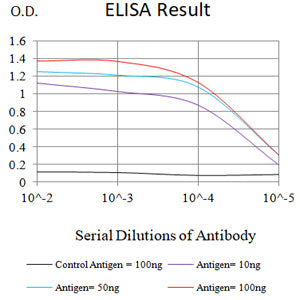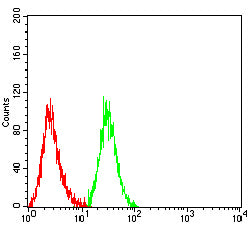

| WB | 咨询技术 | Human,Mouse,Rat |
| IF | 咨询技术 | Human,Mouse,Rat |
| IHC | 咨询技术 | Human,Mouse,Rat |
| ICC | 技术咨询 | Human,Mouse,Rat |
| FCM | 1/200 - 1/400 | Human,Mouse,Rat |
| Elisa | 1/10000 | Human,Mouse,Rat |
| Aliases | ELAM; ESEL; SELE; ELAM1; LECAM2 |
| Entrez GeneID | 6401 |
| clone | 7H8C11 |
| WB Predicted band size | 66.7kDa |
| Host/Isotype | Mouse IgG1 |
| Antibody Type | Primary antibody |
| Storage | Store at 4°C short term. Aliquot and store at -20°C long term. Avoid freeze/thaw cycles. |
| Species Reactivity | Human |
| Immunogen | Purified recombinant fragment of human CD62E (AA: extra(22-162)) expressed in E. Coli. |
| Formulation | Purified antibody in PBS with 0.05% sodium azide |
+ +
以下是关于CD62E(E-selectin)抗体的3篇参考文献的简要概述:
---
1. **文献名称**: *E-selectin mediates leukocyte rolling in interleukin-1-treated rabbit mesenteric venules*
**作者**: Ley, K., Gaehtgens, P., Fennie, C., et al.
**摘要**: 该研究通过体外实验证明,CD62E抗体可显著抑制白细胞在内皮细胞激活(IL-1β刺激)后的滚动黏附行为,揭示了E-selectin在炎症初期介导白细胞与血管内皮相互作用的关键机制。
2. **文献名称**: *Blocking E-selectin inhibits tumor progression and enhances cytotoxic T-cell infiltration in a cutaneous melanoma model*
**作者**: Läubli, H., Stevenson, J.L., Varki, A., et al.
**摘要**: 研究利用CD62E抗体阻断E-selectin功能,发现其可减少黑色素瘤小鼠模型中肿瘤细胞的血液播散,并促进抗肿瘤T细胞在病灶部位的浸润,为肿瘤免疫治疗提供了新策略。
3. **文献名称**: *E-selectin antibody inhibits reperfusion injury and enhances mucosal healing in experimental colitis*
**作者**: Yamada, T., Grisham, M.B., & Volk, S.
**摘要**: 实验表明,CD62E抗体通过抑制缺血再灌注过程中内皮细胞E-selectin的活化,减轻肠道炎症损伤,并加速结肠黏膜修复,提示其在炎症性肠病治疗中的潜在应用。
---
以上文献聚焦于CD62E抗体在炎症、肿瘤转移及缺血损伤中的功能阻断效应,展示了其基础研究与临床转化价值。如需具体文献来源,建议通过PubMed或Web of Science按标题/作者检索。
CD62E, also known as E-selectin, is a cell surface glycoprotein belonging to the selectin family of adhesion molecules. It is primarily expressed on activated endothelial cells in response to inflammatory cytokines such as TNF-α or IL-1β. CD62E facilitates leukocyte recruitment by mediating the initial tethering and rolling of circulating immune cells along the vascular endothelium, a critical step in the inflammatory response. Its structure includes an N-terminal lectin domain, an epidermal growth factor (EGF)-like domain, and multiple complement regulatory protein repeats, enabling interactions with carbohydrate ligands like sialyl Lewis X on leukocytes.
CD62E antibodies are essential tools in studying endothelial activation in pathologies such as atherosclerosis, sepsis, and cancer metastasis. These antibodies can block CD62E-ligand interactions, making them valuable for investigating leukocyte-endothelial adhesion mechanisms. In clinical research, CD62E expression is often assessed as a biomarker of endothelial dysfunction or inflammation. Therapeutic applications targeting CD62E have been explored to mitigate chronic inflammation or prevent cancer progression, though no approved therapies currently exist.
Overall, CD62E antibodies serve as both research reagents for elucidating vascular biology and potential candidates for developing anti-inflammatory or anti-metastatic therapies. Their role in visualizing or modulating endothelial activation underscores their importance in biomedical research.
×